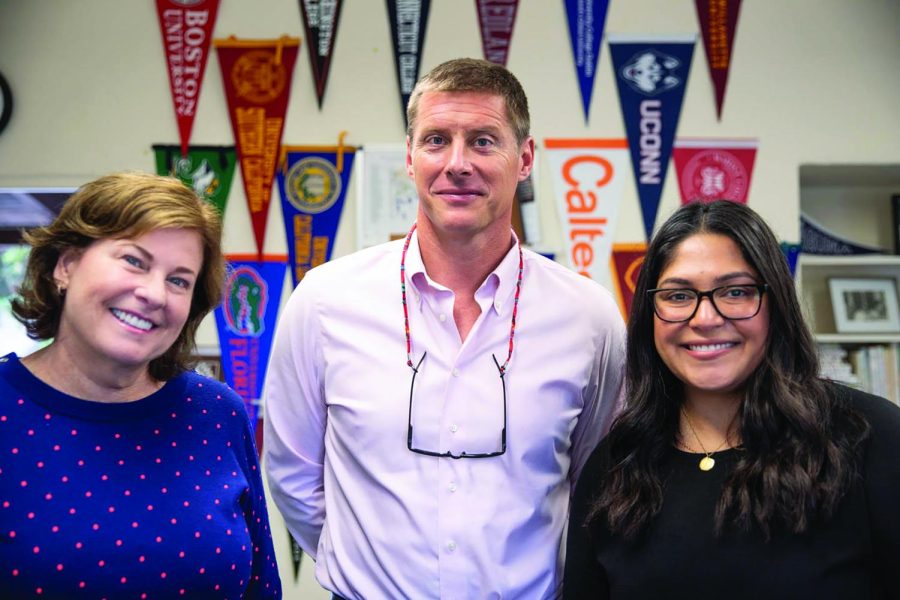College Counseling Team
As the school year starts, we welcome the new college counseling team. During the interview, the three college counselors offered insights about their own college admission philosophy and many other aspects of the often mystified field of college admission.
November 14, 2022
Interview with the College Counseling Team
As the school year starts, we welcome the new college counseling team. During the interview, the three college counselors offered insights about their own college admission philosophy and many other aspects of the often mystified field of college admission.
Struckmeyer: Director of College Counseling
- What is your college admission philosophy?
College is a match to be made, not a prize to be won. It’s a matter of you matching with an institution that is appropriate to your abilities and things you are particularly interested in; if you have well-developed interests, then you should consider schools that honor those interests, and beyond that, there are other cultural considerations that are really important: do you learn best by taking one class at a time or many classes at a time? Are the students morally or intellectually serious? Or does the school have an atmosphere that matches my values? Those are the key things, and that is my philosophy.
- What makes a student stand out in their essays?
First, I will say what doesn’t make them stand out in their essays: a recitation of the things they are good at that are almost always already listed in their application under the activities section. We ask college admissions officers this question all the time, and they all roll their eyes or slap their forehead at how bored and exasperated they are when students use their essays as an opportunity to point back at their activities. But when a student ventures to talk about something that has great personal importance to them, that perhaps is not academic in nature, and in a lively, vivid, or authentic way, it can provide a keyhole-view into their interior world of what they value, that is a home run every time in a college essay because that makes a student memorable.
- What has changed over the years in college counseling, and what does the future look like?
The fear of not getting into a good school has grown well out of proportion, we can all understand the anxiety around getting into college, but it’s also a period of growth as one becomes aware of their abilities and starts to learn that they will be desirable to many colleges. It’s a fact that students can accept themselves, getting good grades, getting into honors classes, and being voted student council; it’s a healthy self-awareness that they will have a lot of value in the college marketplace. But what has changed the most is an overwhelming fear that is driving students to unhealthy lengths and that somehow their life prospects are going to be diminished if they don’t get into this school or that school; we think that is a dangerous and utterly untrue myth. Students who work hard and do well at laguna will have a staggering array of opportunities, and admission to a great school is virtually guaranteed because, as we well know, the selectivity of the school does not proxy its quality. It’s a statement of its popularity. We recognize that there is a randomness that bakes into getting into a school but aside from understanding that there is that randomness and that not everyone can get in, the fact that fear is so much a part of it, like the stakes are life or death and they are not life or death, that trend is accelerating, and we very much hope that it subsides, but I feel like as environmental concerns and economic concerns and risk of nuclear war in Ukraine, i think some families really doubled down on the college process as a way of coping with those external fears, because it is seemingless something that can be controlled, and so that is an element that exaggerates the anxiety.
- What is the one piece of advice that you want to tell students in each grade level?
Freshman: to realize that what your teachers think of you is far away the most important thing you can influence, and it’s the most important thing overall, as opposed to thinking about getting the highest grade in the class because that is not a proxy necessarily for the teacher admiring you. When the teacher thinks this person embraces learning, they are kind and collaborative with their peers, that teacher is likely to praise you very highly down the road, and that matters a lot.
Sophomore: same applies to sophomore year. But because you have been admitted, by then, to honors classes, the important thing is to continue the reputation for academic seriousness and excellence so as to have the broadest opportunities in the junior year in terms of being nominated for AP classes and the like.
Juniors: Make sure that you physically visit colleges of very different styles and try to attend a class or two along the way, because to go to a liberal arts college in a city that you really like, say Boston, is great; now ask if you can attend a class, and likewise if you go across town to Harvard or Boston University, request to attend a class, because then you will truly be getting a sense of what college will be like, and the classroom visit is key because you get a sense of how are students learning here.
Seniors: approach college like home buying, recognize that you can bid on certain houses and the seller may not sell you the house for random reasons that you can’t ever know even though your money was perfectly good, but visit enough houses to know that what you truly like where you want to live, and know that there could be two houses that are quite different that you could live in just as great and be happy living in that home, that is a very good analogy of approaching the college search. Know realistically as a buyer, realistically are you gonna be taken seriously or not, with the goods that you have but know that you could be denied for random reasons that have nothing to do with you.
- What is your opinion on people hiring counselors outside of school?
For Laguna which has such a highly qualified college office, I think it’s often a mistake to hire the college counselor before the fall of the senior year because I don’t think that the outside counselors can really add anything in the area of listed elements, or application strategy or philosophy. I don’t think they have much to add beyond what we do here. Where I’d say outside counselors can be very valuable is when the senior in the fall who is jamming along with their four APs, your extracurricular activities may be the musical or fall play, sports, find someone who will meet with you for an hour once a week to help you stay on top of your application, that could be money well spent, but that is a fairly narrow use of the outside counselors, because a lot of students busy during the day can’t see us during office hours but maybe at 8 pm Tuesday evenings, that would be a great time to meet with their private counselors to work on their apps.
- Is there anything else you would like to add?
Gonzalez: Registrar
- What is your college admission philosophy?
My college admission philosophy is actually a book titled Where You Go is Not Who You Will Be [by Frank Bruni], and I like this book and specific philosophy because a lot of students think that they will be successful if they go only to the ivy leagues or the well-known school around the country and that is not always the case, there are so many smaller schools and independent liberal arts colleges that will give you the same amount of success of not more, so that is one thing I always like to remind people of.
- What makes a student stand out in their essays?
When a student writes about adversity. I think that helps to make them stand out to college admission officers only because it shows that you were able to persevere whatever challenges you faced, and that is probably the most important part is to make sure that the students come through in their writing.
- What has changed over the years in college counseling, and what does the future look like?
College counseling has evolved so much over the past five years, from test-optional to discovering these small colleges, and I think it has really helped students and families to know about all of the options that are available, so moving forward, if schools continue their test-optional rule, then I think it could completely change the future of college admissions.
- What is the one piece of advice that you want to tell students in each grade level?
Freshman: The college process is not as scary as it seems
Sophomores: Step outside their comfort zone and try things they have never thought they could do, and this could open many doors to extracurricular activities and more experience and that, in turn, will give you more things to write about in your college essays.
Juniors: focus on your academics and extracurricular activities, and really start thinking about your colleges, the things you want to look for, and schools that would be tailored to you.
Seniors: relax, and work with the college counselors who are here every day to help you with every single thing.
- Can you give some advice to students on creating a well-balanced schedule?
When you see your schedule for the very first time in the summer, don’t be alarmed at what courses you were signed up to take, I think it’s really important to trust the process that has been put in place because it is created to make sure that all students are successful ad prepared for college, so trusting the process is my biggest piece of advice, because we are not going to let you fail or fall behind, and if you come to us and say you are not challenged enough, in a second, we will get you into the right place, so trusting the process is big because we have come up with all these different things that students have to do to make sure that they are on track to graduate and attend a college or university.
- Is there anything else you would like to add?
Believe in yourself! Very often, students come to me and say: I really want to transfer into or out of ap or honors class into something lower, my suggestion is: have you taken your first test or quiz, and how did you do? Because a lot of the time, you think you won’t be successful in this class, but you are maybe underestimating your own capabilities.
Murray Sr. Associate Director of College Counseling
- What is your college admission philosophy?
My college admissions philosophy is based on the best-fit philosophy. We are working and helping students to discern what the best match would be for him or her, to meet their academic and personal goals, strengths, and abilities; all these things come into play when looking at the different institutions out there and what they have to offer; so it’s about making a match, and it’s more college counseling than it is college placement.
- What makes a student stand out in their essays?
The authentic voice is key. The students have incredible experience and rich offerings to showcase in an admission essay. And our college admissions colleges are very savvy at deducing whether a student or a 55-year-old adult has written the essay. Authentic student voice and being able to express oneself in the most authentic and compelling way is everything.
- What has changed over the years in college counseling, and what does the future look like?
It’s ever-changing. As we know, the test-optional movement, for example, has been around for decades, and more and more colleges and universities are adapting to test-optional or test-blind, in light of this global pandemic and students not having access to testing sites, and I think that is a massive shift in these times. The college applications to highly selective institutions and most competitive institutions have increased markedly as a result of that test-optional movement, and so that increases the applications which affect the admit rates to go down, and the apps are saturating the market, so more than ever before, college and universities are leaning into the personal statement, the essays, and the recommendation letters more than ever before as differentiators.
- What is the one piece of advice that you want to tell students in each grade level?
Freshmen: Enjoy being in high school! This is the time to explore and enjoy. Learning new things, meeting new people, getting involved, maybe join in a club or two, just dipping your toe in the water.
Sophomores: Sophomores are in the best position because they’ve had a year of high school under their belt; they are learning how to be strong learners, they are learning how to be studious, self-advocate to meet with teachers to find out additional things they might be interested in that school. My best advice is to seek joy; be involved again, and continue that thread of finding new things that bring them joy.
Juniors: Juniors are on the cusp of this college admission process, and I think it’s so neat to be able to sit on one on one with juniors and get to know each and what makes them tick, and my advice for them would be: when you are ready, we will meet you where you are, as far as the college admissions piece, but for right now focus on school and taking advantage of all the recourse that the school has to offer you.
Seniors: My best advice for seniors is to stay in your own lane and remember all the things you have control over. The seniors have control over many aspects of the college admissions process, and we talk about those and review those and how to best position themselves, and it’s important for them not to get caught up and compare themselves to one another and just enjoy their own process of being their own journey.
- What is your opinion on people hiring counselors outside of school?
The work of the college counselors at Laguna is very different from what independent counselors do. We have two full-time counselors at Laguna, and we devote attention to the fine details; we are accessible and knowledgeable in the college admission landscape. We are in the strong position to advocate for our students directly with the college and universities, as we know our students well! We write personalized letters of recommendation, and we have the ear of the college admission officers. We communicate directly with the colleges about our applicants–a role that is reserved only for the high school college counselor. We have our students’ best interests at heart, and we love what we do!
We collaborate and partner with students, parents, and college admissions officers throughout the student’s college journey. We guide and support our students through every step of their college search, applications, and admissions process. We visit colleges all over the world, and importantly, we remain abreast of the ever-changing college admission landscape. We counsel our students toward the best-fit colleges, and we work together with our incredible faculty to produce the best possible outcome for our students. Laguna Blanca resources are here!
- Is there anything else you would like to add?
I love being here, I am so happy that I came to Laguna Blanca. I am so impressed with all of you, the students are amazing here.


































